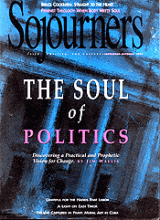Woman was defined as body only, historically. Man was mind and soul, the "better" part. As body, woman was dangerous, the home of lust, the issuer of defiling blood; she was chaos—like the sea, she only answered to the moon. She was without conscience and mind enough to know the way of righteousness on her own.
Yet women have always been mystics and preachers, prophets and teachers, servants and leaders, as well as whores, virgins, and mothers.
Women have talked about God—have sought, defied, laughed with, cursed, praised, wept for, and pondered God. But their knowledge has been divided up, boxed away, and ignored, except for glimmers in the story, in the tradition—the name of the house church leader, the writings of a mystic, the story of a girl raped and killed. And in that boxing up, creation itself has been divided, defiled. The full revelation of God has been packed away.
Feminist theology is, in part, the effort to reunite body and soul. It is the effort for women to reclaim the power of speech, the power to tell what they know about God, to question the tradition that tried to take away their God-given voice, to create new expressions of the life of faith. As with all passionate endeavors, it can be both controversial and a rich source of life and energy in the church.
Questions that are raised by feminist theology, even by women who fiercely claim the Christian tradition, can seem to strike at the very foundations of that faith. Alternative expressions of spirituality that emerge as women explore life with God on their own terms can seem too strange, new, different.
But we have to place theology in its proper context. It has never been an exact science or a world of once-and-for-all pronouncements. A theologian is always exploring the shifting places where revelation, tradition, his or her current circumstances, and mystery meet. Uncertainty is intrinsic to authentic theology; God cannot be caged.
Read the Full Article

